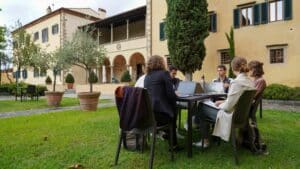The Summer School provides the best opportunity for professionals working on the regulation of transport to update their perspectives on the most recent topics, and to share their views with public officials, industry colleagues and academics, as well as to newcomers to familiarise with the regulatory debates in the industry.
During this residential summer school at the European University Institute’s premises in Florence, you will have an opportunity to dive deep into the main issues affecting the transport and mobility sectors, namely competitiveness, decarbonisation and digitalisation challenges in the transport sector. The programme will dedicate a full day to studying each of these topics, with specific attention to railways and aviation, but also to the main transversal challenges.
After completing this Summer School on Transport Regulation, you will be able to answer the following burning issues affecting the transport and mobility sectors:
In addition, enrolling in the Summer School guarantees you a spot at the academic conferences on Rail Regulation (7 July 2025) and Aviation Regulation (11 July 2025).
In the last five years the geostrategic context has shifted considerably. War, trade imbalances and a decline in competitiveness due to policies such as decarbonisation create new challenges. New policies are necessary to ensure the resilience of European transport and the global competitiveness of European companies.
The main driver of EU transport policy over recent decades has doubtlessly been the construction of the Single European Transport Area (SETA). This broad objective remains relevant as there are obvious gains in competitiveness when reducing fragmentation and increasing competition in the SETA. Prof. Montero and Prof. Finger in their introduction to the Summer School will provide an overview of the European Transport Policy and the SETA.
However, additional competitive gains can be achieved by reinforcing a systemic approach in European transport, and regulation has an important role to play. Fragmentation in the transport ecosystem due to vertical and horizontal separation reduces efficiency, and the current regulatory framework lacks coordination tools. Urban nodes play a fundamental role in such a systemic approach. EU transport policy has always focused on corridors, but more attention should be paid to nodes, and in the case of transport, nodes are in and around cities and metropolitan areas. Nodes are indeed key to increasing the efficiency and resilience of the overall transport system. They are also key to competitiveness. On July 9 the whole day of the training is dedicated to the competitiveness in EU Transport. Prof. Thanos Pallis will explore competitiveness in maritime transport. Prof. Matthias Finger will present lessons on industrial policy in transport, SESAR, ERTMS.
Digitalisation enables new efficiencies because it facilitates information exchange and coordination. It is the best tool to reinforce a systemic approach. Furthermore, digitalisation empowers more active infrastructure management to create efficiencies in all the network industries. Regulation is necessary to accelerate business-to-business data exchanges when bottlenecks persist, which is often the case in transport. Prof. Juan Montero will share his vision on simplification of digital regulation in transport. Pauline Aymonier will speak about Digitalisation of infrastructure.
The Draghi Report calls for a more active industrial strategy. Transport is a good case in point as it has been at the frontline of large innovation programmes in the EU (ERTMS, SESAR, etc.). Investment in transport programmes should not be replaced by investment in new technologies such as AI and new materials etc. but combined with them. Valuable lessons can be learnt from the difficulties in implementing technologies developed by these programmes.
In the next five years there will need to be a focus on implementing decarbonisation legislation, which will lead to important challenges. Prof. Steven Truxal will explore the carbon leakage risks facing the aviation sector and SAF regulation.
There is a chicken-and-egg problem, as the supply of chargers for electric vehicles and providers of alternative fuels in general is too slow, thus limiting the uptake. Furthermore, transport is the hardest-to-abate emission sector in Europe. In the longer term, as decarbonisation in transport progresses, energy might well become a bottleneck and costs will increase, thus challenging connectivity. The Draghi Report is particularly vocal about aligning decarbonisation with industrial policy. In transport this means that innovations need to be supported to develop new technologies. Massive investment in the deployment of existing and future solutions will have to be ensured, making decarbonisation not only a challenge but an opportunity. Doubts will deter the necessary investments and exacerbate the chicken-and-egg problems. However, flexibility is necessary to accommodate the targets and obligations in these hard-to-abate sectors.
Against this backdrop, the third edition of the Summer School on Transport Regulation will enable participants to share insights on the fundamental regulatory principles of the transport sector through hands-on activities based on real cases and examples with instructors from academia, national regulatory authorities and ministries, the European Commission and the industry.
After completing this course participants will have:
In addition, registering for the Summer School secures you a place for the academic conferences on Rail Regulation (7 July 2025) and Aviation Regulation (11 July 2025). The conferences will evaluate the existing policies and analyse new proposals to accelerate the growth of the Railways and Aviation Industries. The approach would be interdisciplinary and multidisciplinary, allowing for a specific yet holistic overview of the current regulatory frameworks. They will discuss current economic and regulatory policies relating to air and rail transport and identify future regulatory challenges.
The course is given in English and developed for:
Please note that for this course only a selected number of participants will be admitted.
Applicants shall meet the following admission requirements:
Course programme
Tuesday 8 July 2025
Topic of the day: Innovation
9:00 – 10:15 Introduction to the Summer School. The European Transport Policy
10:15 – 12:00 Joint session: Innovation
12:00 – 13:00 Lunch
13:00 – 14:30 Parallel sessions:
Air Session I. Implementation of SES 2+. Part I
Rail Session I. Innovation in Rail sector
14:30 – 15:00 Coffee break
15:00 – 16:30 Parallel sessions:
Air Session II. Implementation of SES 2+. Part II
Rail Session II. Innovation in Rail sector
16:30 – 17:00 One-to-one discussions with lecturers
Wednesday 9 July 2025
Topic of the day: Competitiveness
9:00 – 10:15 Joint session I. Competitiveness in EU Transport
10:15 – 12:00 Joint session II. Competitiveness in EU Transport
12:00 – 13:00 Lunch
13:00 – 14:30 Joint session III. Competitiveness in EU Transport
14:30 – 15:00 Coffee Break
15:00 – 16:30 Joint session IV. Competitiveness in EU Transport
16:30 – 17:00 One-to-one discussions with lecturers
Thursday 10 July 2025
Topic of the day: Environment
9:00 – 11:00 Parallel Sessions:
11:00 – 11:30 coffee break
11:30 – 13:00 Parallel Sessions:
13:00 – 14:00 Lunch
14:00 – 15:15 Joint Session. Environment
15:15 – 15:45 Coffee Break
15:45 –16:30 Joint Session. Concluding remarks, closure of the Summer School
16:30 – 17:00 One-to-one discussions with lecturers
At the end of the course, participants will receive a Certificate of Participation.
Each year, the Florence School of Regulation – Energy and Climate (FSR Energy & Climate) awards scholarships for a wide variety of training courses targeting a broad audience of professionals and academics.
Applications will be assessed by a Selection Committee of FSR members on a yearly basis. The successful candidates will be informed after February 2024 and will be provided with all relevant information on how to enroll in the online course or residential training of their choice.
Send your application by 2 February 2025.
General fee: 2,500 €
Fee for FSR Transport donors and public authorities: 1,500 €
One day participation fee: 1,000 €
One day participation fee for FSR Transport donors and public authorities: 750 €
The fee includes participation at the Summer School (and in addition the Rail Conference on July 7 and the Air Conference on July 11), coffee breaks, lunches, welcome aperitivo at FSR premises (July 7), and social activity (guided visits to the EUI villas).
The fee does not include travel expenses & accommodation.
Deadline: 31 May 2025 for registration and payment
Cancellation Policy
Paid registration fee is non-refundable. However, registrant substitution may be made up to 20 days before the start date of the course.
For more information on logistics, please contact the RSCAS Conference Unit.
Learn about the fundamental regulatory principles of the transport sector through hands-on activities based on real cases and examples with instructors from academia, national regulatory authorities and ministries, the European Commission and the industry.

The role of space in tackling real-world challenges is still emerging, yet it holds the potential to transform every aspect of our daily lives, economies, and digital futures. To realise…

The Energy Law Research School seeks to offer emerging scholars (doctoral and postdoctoral researchers) in EU energy law the opportunity to gain an understanding of the most important issues in…

Crafting research with impact on energy policy and regulation LARS is a residential training addressing researchers with modeling skills who are keen to support the energy policy and regulatory debate.…

EU Electricity Network Codes & the Clean Energy Package Enter the world of electricity markets in Europe ‘Evolution of electricity markets in Europe’ is an 8-week online course in collaboration…

2025 marks the tenth anniversary of the Paris Agreement. The ‘Getting to Net Zero’ course at the Florence School of Regulation aims to provide an overview of the role of the…

This new training course on the Regulation and Integration of Renewable Energy provides a comprehensive introduction to the topic with the latest updates, including developments in policy and regulation in…

Originally designed for participants in the EUI Global Executive Master, this course is now open to all professionals seeking to deepen their understanding of energy markets and regulation. Three features…

Digitalisation is transforming transport and mobility. Understanding the regulatory implications of digitalisation requires knowledge of EU digital law and policy (DSA, DMA, Data Act) and the regulatory strategy in transport…

Regulation of energy utilities All you need to know in one professional course With the Annual Training on the Regulation of Energy Utilities, you will gain extensive knowledge of the fundamental principles of…
To meet, discuss and learn in the channel that suits you best.